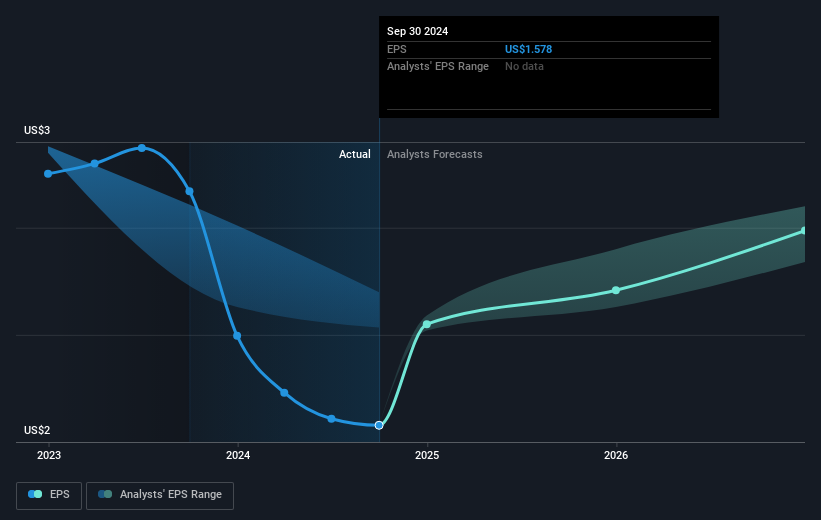- United States
- /
- Banks
- /
- NasdaqGM:VBTX
Veritex Holdings (NASDAQ:VBTX) stock falls 4.8% in past week as three-year earnings and shareholder returns continue downward trend

For many investors, the main point of stock picking is to generate higher returns than the overall market. But in any portfolio, there are likely to be some stocks that fall short of that benchmark. We regret to report that long term Veritex Holdings, Inc. (NASDAQ:VBTX) shareholders have had that experience, with the share price dropping 39% in three years, versus a market return of about 25%. More recently, the share price has dropped a further 15% in a month.
With the stock having lost 4.8% in the past week, it's worth taking a look at business performance and seeing if there's any red flags.
See our latest analysis for Veritex Holdings
While markets are a powerful pricing mechanism, share prices reflect investor sentiment, not just underlying business performance. By comparing earnings per share (EPS) and share price changes over time, we can get a feel for how investor attitudes to a company have morphed over time.
Veritex Holdings saw its EPS decline at a compound rate of 14% per year, over the last three years. This fall in EPS isn't far from the rate of share price decline, which was 15% per year. So it seems that investor expectations of the company are staying pretty steady, despite the disappointment. It seems like the share price is reflecting the declining earnings per share.
You can see below how EPS has changed over time (discover the exact values by clicking on the image).

It's probably worth noting that the CEO is paid less than the median at similar sized companies. It's always worth keeping an eye on CEO pay, but a more important question is whether the company will grow earnings throughout the years. It might be well worthwhile taking a look at our free report on Veritex Holdings' earnings, revenue and cash flow.
What About Dividends?
As well as measuring the share price return, investors should also consider the total shareholder return (TSR). The TSR is a return calculation that accounts for the value of cash dividends (assuming that any dividend received was reinvested) and the calculated value of any discounted capital raisings and spin-offs. So for companies that pay a generous dividend, the TSR is often a lot higher than the share price return. As it happens, Veritex Holdings' TSR for the last 3 years was -33%, which exceeds the share price return mentioned earlier. The dividends paid by the company have thusly boosted the total shareholder return.
A Different Perspective
Veritex Holdings shareholders gained a total return of 20% during the year. But that was short of the market average. On the bright side, that's still a gain, and it's actually better than the average return of 1.3% over half a decade This could indicate that the company is winning over new investors, as it pursues its strategy. I find it very interesting to look at share price over the long term as a proxy for business performance. But to truly gain insight, we need to consider other information, too. Even so, be aware that Veritex Holdings is showing 2 warning signs in our investment analysis , you should know about...
If you like to buy stocks alongside management, then you might just love this free list of companies. (Hint: many of them are unnoticed AND have attractive valuation).
Please note, the market returns quoted in this article reflect the market weighted average returns of stocks that currently trade on American exchanges.
New: Manage All Your Stock Portfolios in One Place
We've created the ultimate portfolio companion for stock investors, and it's free.
• Connect an unlimited number of Portfolios and see your total in one currency
• Be alerted to new Warning Signs or Risks via email or mobile
• Track the Fair Value of your stocks
Have feedback on this article? Concerned about the content? Get in touch with us directly. Alternatively, email editorial-team (at) simplywallst.com.
This article by Simply Wall St is general in nature. We provide commentary based on historical data and analyst forecasts only using an unbiased methodology and our articles are not intended to be financial advice. It does not constitute a recommendation to buy or sell any stock, and does not take account of your objectives, or your financial situation. We aim to bring you long-term focused analysis driven by fundamental data. Note that our analysis may not factor in the latest price-sensitive company announcements or qualitative material. Simply Wall St has no position in any stocks mentioned.
About NasdaqGM:VBTX
Veritex Holdings
Operates as the bank holding company for Veritex Community Bank that provides various commercial banking products and services to small and medium-sized businesses, and professionals.
Flawless balance sheet second-rate dividend payer.
Similar Companies
Market Insights
Community Narratives




